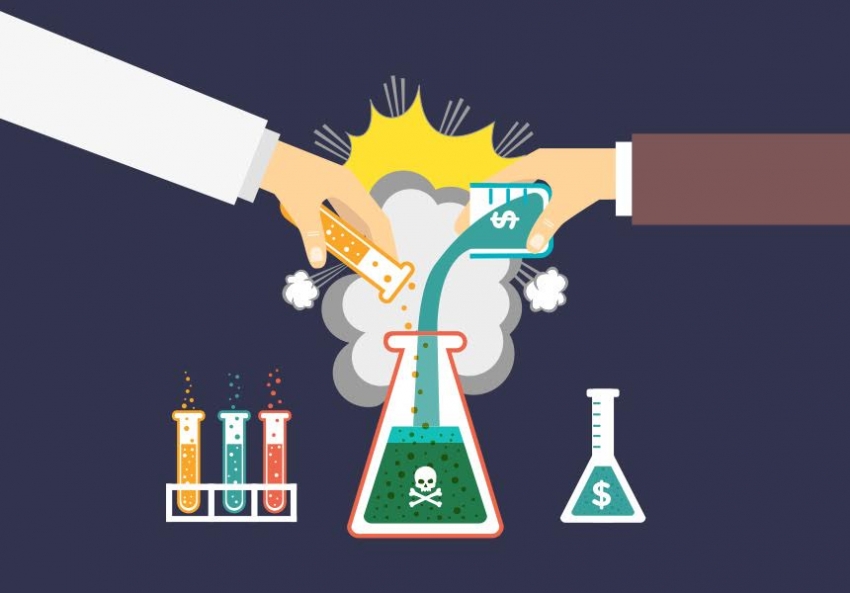General Discussion
Related: Editorials & Other Articles, Issue Forums, Alliance Forums, Region ForumsWhy the United States Leaves Deadly Chemicals on the Market

(In These Times) Scientists are trained to express themselves rationally. They avoid personal attacks when they disagree. But some scientific arguments become so polarized that tempers fray. There may even be shouting.
Such is the current state of affairs between two camps of scientists: health effects researchers and regulatory toxicologists. Both groups study the effects of chemical exposures in humans. Both groups have publicly used terms like “irrelevant,” “arbitrary,” “unfounded” and “contrary to all accumulated physiological understanding” to describe the other’s work. Privately, the language becomes even harsher, with phrases such as “a pseudoscience,” “a religion” and “rigged.”
The rift centers around the best way to measure the health effects of chemical exposures. The regulatory toxicologists typically rely on computer simulations called “physiologically based pharmacokinetic” (PBPK) modeling. The health effects researchers—endocrinologists, developmental biologists and epidemiologists, among others—draw their conclusions from direct observations of how chemicals actually affect living things.
The debate may sound arcane, but the outcome could directly affect your health. It will shape how government agencies regulate chemicals for decades to come: how toxic waste sites are cleaned up, how pesticides are regulated, how workers are protected from toxic exposure and what chemicals are permitted in household items. Those decisions will profoundly affect public health: the rates at which we suffer cancer, diabetes, obesity, infertility, and neurological problems like attention disorders and lowered IQ. ..................(more)
http://inthesetimes.com/article/18504/epa_government_scientists_and_chemical_industry_links_influence_regulations
Erich Bloodaxe BSN
(14,733 posts)Your computer simulations are leaving out real world interactions with everything else in the environment, in people's bodies. Computer models only tell you about what you put into them, and nobody puts everything in. It's just too incredibly time intensive to create a model that exactly replicates the incredible number of variables that exist in reality.
daleanime
(17,796 posts)PATRICK
(12,228 posts)scientists paid by certain industries or politicized government agencies war with others with the middle ground being the cemetery. And no, no scientist probably realizes the psychology of innate bias. The reasonableness has been corrupted a long time by current prejudice. You would like to weight the argument heavily on caution or pre-testing, especially in the known toxin field. How much radiation is harmful? Depends on the strength of the nuclear industry or Cold War. Until the casualties come in- maybe. Are cigarettes responsible for certain deaths? Until a general massacre ensues- a grudging acceptance- and partial regulation!
I think- and I worked there for a while in the seventies- that France had some of these "discussions". Conservatism predominated and boundaries too generous. Then, after a clear comparison to the new, poisoned generation, they finally reduced a lot of things including pollution and consumption content. The US after WWII just binged on an on until the comparisons got lost in the shuffle, even when cigarette deaths were obvious and the generational deaths just slurred into a blurry mix. Instead of increasing our monitoring of possible toxins there is always, as in obvious climate change, a constant backpedaling with the seemingly sole motivation of increasing our industrial system-cheap social infrastructure creation of valueless money that seems to flourish like a forest from our cemeteries.
A balance between safety and acceptable risk?
I am positive they have cogent arguments to combat hysteria or over protectiveness. We are all reasonable people trying to economize, survive in an imperfect environment. Or are our hidden values toxic in themselves?
Erich Bloodaxe BSN
(14,733 posts)observe how two compounds or structures interact or potentially interact. Want to know if a specific compound has a pathway to cross the cell barrier? Go ahead and use your models to see if there's a mechanism facilitating or simply transport.
But when it comes to declaring things 'safe' or 'toxic', you need to see how they act in the wild, as it were, not just in highly controlled circumstances. Otherwise, you only find out if it's 'safe' in exactly the way for which you tested, in exactly the conditions you modeled.
I think a lot of people, even those who work in science, simply tend to lose sight of that basic premise - that you basically often simply see what you're testing for, and overgeneralize from your results into far too sweeping statements.
Whiskeytide
(4,461 posts)... "Which methodology does the industry support?" That answer will tell you everything you need to know.
librechik
(30,674 posts)fewer and fewer annoying disease ridden humans.